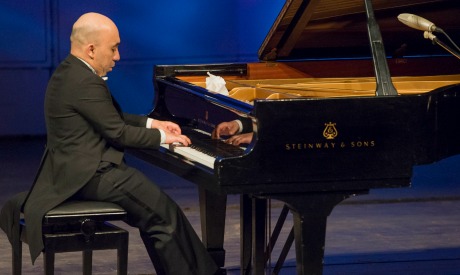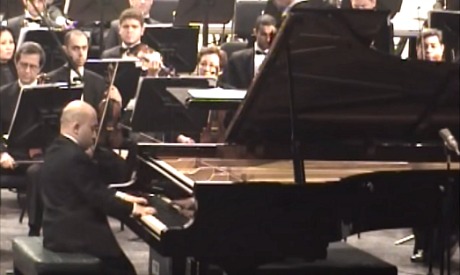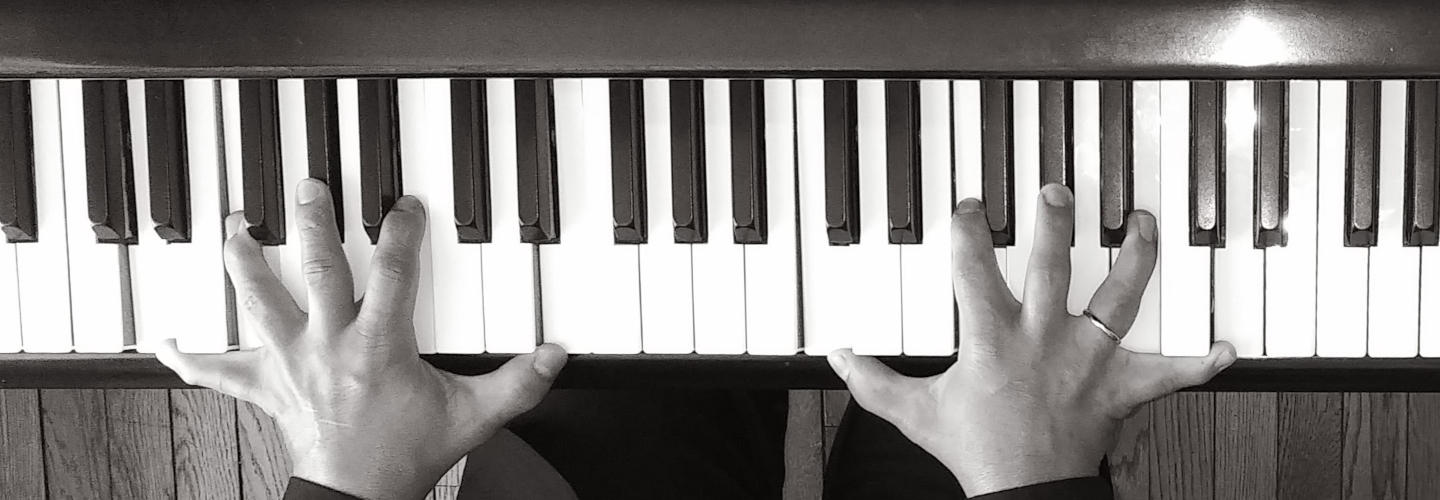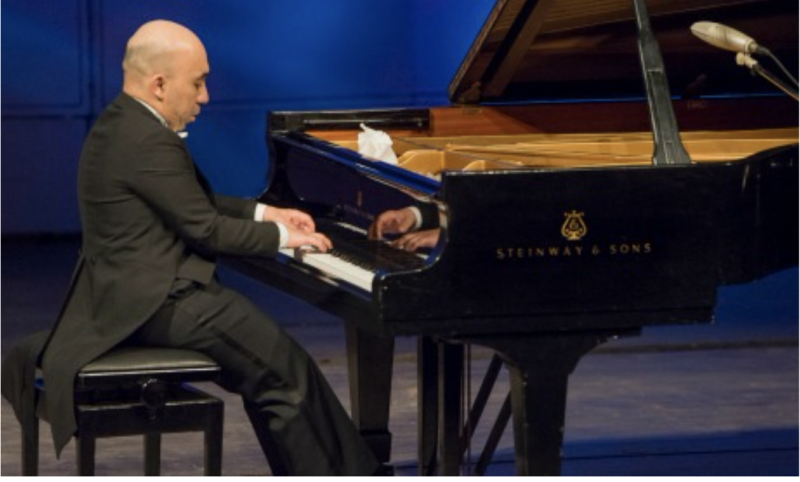By Ati Metwali:

Rachmaninoff back-to-back: Inspiring Egyptian pianist Wael Farouk to play at McAninch Arts Centre, USA
Ati Metwaly , Friday 12 Mar 2021
Considered to be the Mount Everest piece for piano, US-based Egyptian pianist Wael Farouk will perform with the New Philharmonic conducted by Kirk Muspratt. The concert will be available on-demand starting mid-April

Wael Farouk (Photo: Bassam Al Zoghby)ShareFacebookTwitterWhatsAppTelegramLinkedIn
Related
INTERVIEW: Mind and soul: An evening with internationally acclaimed pianist Wael Farouk
“I have been so fortunate in my career to have the opportunity to meet some of the most talented people in the country. About four years ago I met Wael Farouk. I have to say there is something about the story that just continues to stay with me,” said Diana Martinez, Director of the McAninch Arts Centre last month at an interview with the inspirational pianist.
Recorded and posted on the centre’s YouTube channel, the interview was held during lockdown, featuring Martinez, Farouk and Maestro Kirk Muspratt who will conduct the New Philharmonic during the on-demand concert of Rachmaninoff’s all three concerti: Concerto no. 1 in F-sharp minor, Concerto no. 2 in C minor and Concerto no. 3 in D-minor. The concert will premiere on 17 April and will be available on-demand through 15 June.
“This is widely considered to be the Mount Everest piece for piano, requiring a pianist of the highest ability, strength and emotion to perform. These three pieces are so challenging that they have never been performed in one concert before by a single pianist,” reads a comment under the posted video.
Maestro Kirk Muspratt explains that he wanted to showcase Rachmaninoff’s piano concerto with the orchestra when he learnt about Wael Farouk, who has studied all piano works by the famed Russian composer.
Referring to Farouk as “an amazing pianist,” Martinez also sheds light on the many challenges that the pianist had to overcome throughout his formative years and throughout his whole career as he kept rising to international fame.
“On top of being able to play the pieces that nobody else can play, you play them with the challenge that many others don’t have,” she added.
Wael Farouk then begins by talking about his childhood years in Cairo where he was born in 1981. In Egypt was where he was raised and launched his musical education. He mentions his “unusually small hands with very short ligaments,” in addition to his poor vision. A specialised doctor in Cairo encouraged Farouk’s parents to deal with his conditions normally and allow the young boy to explore life to the fullest.
Farouk was only three-years-old when his father bought him a small piano which immediately became his “best friend.” At the age of four, Farouk started playing tunes that he had heard on the radio by ear and soon after one of Cairo’s churches became his main stage for many concerts he held there. At the age of five he already performed in front of the Pope of the Coptic Orthodox Church. The whole process was very unique, as Farouk explains, at the time the Coptic churches did not hold instrumental performances.
When Farouk was seven-years-old, his father encouraged him to enroll at the Cairo Conservatory. Though young Farouk scored the highest marks at the entry exams, the professors were against his dream career pointing to the conditions that would hamper his development and as such create psychological and physical problems.
Neither Farouk nor his parents were discouraged and he embarked on a long and fruitful musical education path, becoming one of the best Egyptian pianists of his generation.
In the interview Farouk recalls his teacher who made him listen to Rachmaninoff’s Piano Concerto no. 3 underscoring that even him, having large hands, cannot play it. The 12-year-old musician did not get discouraged. On the contrary, four years later he gave an Egyptian premiere to this challenging composition.
“It is because of the Rachmaninoff’s third piano concerto that I became a pianist,” Farouk clarifies revealing that to him the work is “the dearest work of art.”
Farouk’s upcoming concert with the New Philharmonic will showcase three concerti, back-to-back. This enormous challenge doesn’t worry the pianist as despite the technical difficulties, he sees that their emotional charge is irresistible.

Pianist Wael Farouk in one of his concerts with the Cairo Symphony Orchestra (Photo: still from Wael Farouk’s YouTube channel)
When speaking about practicing the concerti, Farouk underlines the need for meticulous mental preparation.
“The third Rachmaninoff concerto probably has more notes than all five of Beethoven’s piano concerti combined. However the mental rhetoric or the storytelling is very easy to tell. It is also very personal to me. The physical part of playing the concerti back-to-back is definitely challenging but it is something I have to train myself in,” he said comparing the process to the work of an athlete.
He mentions his Beethoven cycle during which he performed all five concerti, repeating them throughout three consecutive concerts. As he is now preparing for Rachmaninoff’s three concerti, Farouk reveals that he goes through them all at least three times a day and practices up to 10 hours a day.
“Rachmaninoff was a huge man, 6ft 6in, and is known to have had the largest piano hands in the world,” conductor Kirk Murpratt adds in the video. “He wrote his first concerto when he was just 18-years-old, but he had no problem performing it. There are so many notes; it is so hard.”
Muspratt also underlines Farouk’s mesmerizing knowledge that exceeds music field and reaches to art in general, history and life. Those cultural components have definitely played an important role in the pianist’s development as a musician and shaped his view on music and world at large.
With music being the highest art of all, as Farouk puts it, it is during the difficult times of the COVID-19 pandemic and the lockdown that it can bring a relief to everyone.
The pianist dedicates the concert to all those who were discouraged and were told “you should not do this or that; it is too difficult for you.”
“Do not give up too quickly, trust yourself and trust those who support you,” Farouk comments.
Praising Farouk for not only being a great pianist but also a human with a unique talent and a gigantic heart, Martinez underlines the inspiration that the pianist represents to dozens of artists and people in general. “We need this type of healing.”
YouTube interview with pianist Wael Farouk
A Cairo Conservatory graduate and having solicited many accolades in Egypt – receiving, among the other things, the Youngest Egyptian Talent Prize (given by the former First Lady Susan Mubarak), at 13 – and making his orchestral debut, at 19, with Egypt’s premiere of Rachmaninoff’s Piano Concerto no. 3 with the Cairo Symphony Orchestra conducted by Patrick Fournillier in 2000, Farouk then continued his education in the USA. He began as a Fulbright Fellow studying at the Catholic University of America in Washington, moved on to receive a number of certificates and finally earned a doctorate (DMA) from the Rutgers University in New Jersey (2015).
Since 2003, Farouk has lived in the USA, where he started a family. He performs prolifically across five continents at the most prestigious halls – the White Hall in St. Petersburg, Schumann’s house in Leipzig – and is on the faculty of the Chicago College of the Performing Arts at Roosevelt University. His 2013 concert at the prestigious Weill Recital Hall at Carnegie Hall in New York was described as “absolutely masterful.” Among his commitments, he still makes time to visit and perform in Egypt.
Between practicing and performing, Farouk also teaches students in many countries sharing his passion for music with all generations.
With the New Philharmonic conducted by Muspratt and with Farouk on piano, Rachmaninoff concerti will have an on-demand performance available between 17 April and 15 June 2021. The listeners are advised to visit the McAninch Arts Centre website for more details.
Founded in 1986, the McAninch Arts Centre (MAC) “is dedicated to giving residents of west suburban Chicago continued access to engagement with the arts,” reads MAC’s website. The centre is located at the College of DuPage at Glen Ellyn, Illinois, USA.
For more arts and culture news and updates, follow Ahram Online Arts and Culture on Twitter at @AhramOnlineArts and on Facebook at Ahram Online: Arts & CultureSearch Keywords:


